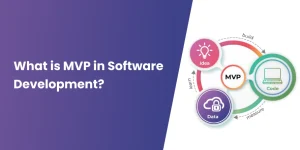What Is Custom Software? Exploring Definition, Benefits, Types, and Trends

Custom software is more than just a tool – it’s a tailored solution designed to meet the unique needs of a business or individual. While off-the-shelf software follows a one-size-fits-all approach, custom software is designed solely to streamline processes, boost efficiency, and deliver a common experience that fits perfectly within the specific ecosystem of the user.
As digitalization accelerates and businesses focus more on customer experiences, generic solutions simply do not cut it. According to a study done by Gartner, the custom software development market has reached maturity and is set to exceed $283 billion in 2028. Custom software provides that personalized touch, designed with precision to unlock the full potential of an organization.
In this blog, we will explore what is custom software, why it has become an integral element in the modern business age, along with its advantages, types, and a lot more.
What is Custom Software?
Custom software is a custom-made application designed to meet the specific needs of a business or individual. It is developed from the ground up to address unique challenges, optimize processes, and enhance overall efficiency.
In simple terms, A custom software application refers to a specific tool or program within this custom solution, built to handle particular business functions. For instance, a healthcare management system designed exclusively for a hospital to streamline patient records, appointment scheduling, and billing processes is considered a custom software application. It is built to fit the hospital’s specific requirements and workflows, offering a more efficient and personalized approach compared to generic solutions.
Businesses that choose custom software benefit from several advantages, including better functionality, increased efficiency, and a competitive edge in their market. Because the software is tailored to the organization’s unique processes, it can scale with the business, integrate seamlessly with existing systems, and provide features that off-the-shelf solutions simply cannot.
Custom Software vs Ready-to-Use Software
When it comes to software solutions, two main types dominate the market: custom software and ready-to-use software. While both serve specific purposes, they differ significantly in terms of design, functionality, and how they are deployed.
Let’s take a closer look at these two types of software:
| Custom Software | Ready-to-Use Software |
|---|---|
| Designed specifically for a particular user or business need. | Built to serve a broad range of users with standard requirements. |
| Highly customizable to fit exact requirements. | Limited customization options. |
| Cost is generally higher due to the development process. | More affordable as it’s mass-produced. |
| Can evolve and scale with the business’s growth. | Fixed features and functionality. |
| Takes more time to develop and deploy. | Ready to use out of the box. |
| Ongoing support and updates tailored to specific needs. | Updates and support are provided by the vendor. |
| Personalized for optimal performance and ease of use. | Standardized experience for a wide range of users. |
| Security features can be customized to meet specific needs. | Predefined security features, often standardized. |
What is Custom Software Development?
Custom software development is the process of designing, building, and deploying software solutions specifically crafted to meet the unique needs of a business or individual.
The development process typically involves several stages, including requirement analysis, design, coding, testing, deployment, and ongoing maintenance. Throughout these stages, developers work closely with stakeholders to ensure that the final product perfectly aligns with the organization’s objectives and seamlessly integrates into existing systems.
This approach allows businesses to have complete control over the features, functionalities, and scalability of their software.
However, choosing the right software development method for these stages is crucial to ensure efficiency and quality.
Why Businesses are Investing in Custom Developed Software?
Investing in developing custom software brings numerous advantages for businesses looking to stay ahead of the competition. Here are some key benefits of custom software development:
- A perfectly designed CRM for your business is designed with all features and functionality you need.
- Custom software also optimizes processes, automating tasks saves time, and reduces errors, making your business more efficient.
- Hiring dedicated developers involves support and maintenance, which means your project will be scalable as business requirements change.
- As your company expands, bespoke software is highly adaptable and scalable, balancing it for the future.
- Custom software can provide features you will not find in any ready to use solution, which can help you to get an edge over your competition.
- Because they are individually developed, custom solutions can provide higher levels of security by being tailored to specific vulnerabilities or industry regulations.
- Custom software allows MVP development that can be tested and iterated upon, ensuring that the final product perfectly fits market needs.
Investing in custom software development not only gives businesses more tailored solutions but also provides them with a long-term, adaptable tool that can evolve with the market. It ensures that your business remains efficient, secure and ready for growth.
Transform Your Vision into Reality for Your Custom Software
Let’s build your perfect custom software together! We turn your ideas into powerful,
tailored solutions that drive success.
Types of Different Custom Software
When it comes to custom software, there are various types tailored to different business needs. Whether it’s streamlining operations, managing customer relationships, or enabling eCommerce, the right type of software can significantly improve business performance.
Below, we explore some of the most popular types of custom software that businesses opt for, each with unique features designed to address specific challenges.
1. Content Management System (CMS)
CMS stands for Content Management System, which helps businesses to create, manage, and modify content on a website without the need for specialized technical knowledge. The terms as a service would work with their functionality and are one of the most customizable options available to provide content updates, website efficiency, and overall organization.
- WordPress
- Drupal
- Joomla
- Squarespace
Features
- Content management feature with an easy-to-use interface.
- Integration with Multimedia such as Images and Videos.
- Scalability and functionality.
- Personalized themes and templates.
- Manage users’ roles & permissions capabilities.
2. Customer Relationship Management (CRM)
CRM software specifically designed to manage and integrate core business processes. It allows businesses to unify all of their customer data in one platform, which leads to better communication, increased sales and an enhanced customer experience.
- Salesforce
- HubSpot
- Zoho CRM
- Microsoft Dynamics 365
Features
- Centralized customer directory.
- Sales and marketing task automation.
- Real-time analysis reporting.
- Integration with other business software.
- Adaptable to individual medical sectors.
3. eCommerce Software
eCommerce software allows businesses to set up and manage online stores, providing a seamless shopping experience for customers. This type of custom software solution can help businesses reach global markets, streamline inventory management, and offer personalized shopping experiences.
- Shopify
- WooCommerce
- BigCommerce
- Magento
Features
- Secure payment gateways.
- Inventory tracking and management.
- Personalized shopping experience.
- Mobile-optimized design.
- Order and shipping management.
4. Enterprise Software Solutions (ERP)
Enterprise Resource Planning (ERP) software is used by businesses to manage and integrate the key parts of their operations. From supply chain management to finance and HR, ERP systems streamline various business processes in a centralized platform, improving efficiency and decision-making.
- SAP
- Oracle ERP
- Microsoft Dynamics 365
- NetSuite
Features
- Integration of different business functions.
- Real-time data and analytics for decision-making.
- Scalable for large enterprises.
- Customizable modules for specific business needs.
- Improved collaboration across departments.
5. SaaS Software
Software as a Service (SaaS) is a cloud-based software delivery model that allows businesses to access software applications over the internet. Custom SaaS software can be designed to serve specific business needs, offering flexibility, scalability, and remote access.
- Google Workspace
- Dropbox
- Slack
- Zendesk
Features
- Accessible from any device with an internet connection.
- Subscription-based pricing model.
- Scalable with business growth.
- Customizable features tailored to business needs.
- Regular updates and maintenance provided by the service provider.
6. Video Streaming Software
Video streaming software enables businesses to stream videos over the internet, either for internal use or to the public. It’s particularly useful for media companies, educational institutions, and any organization that needs to deliver content to a wide audience.
- Netflix
- YouTube
- Vimeo
- Twitch
Features
- High-quality video playback.
- User accounts and personalized recommendations.
- Scalable infrastructure for large audiences.
- Integration with payment gateways for paid subscriptions.
- Mobile and desktop accessibility.
7. Healthcare Software
Healthcare software is designed to meet the specific needs of medical institutions, helping them manage patient records, appointments, prescriptions, and other critical processes. It supports healthcare professionals in providing better services while ensuring data security and compliance with regulations.
- Epic Systems
- Cerner
- Allscripts
- McKesson
Features
- Secure patient data management.
- Integration with hospital management systems.
- Compliance with healthcare regulations (e.g., HIPAA).
- Real-time patient monitoring and analytics.
- Remote patient management options.
Benefits of Using Customized Software
Customized software provides tailored solutions designed to meet your specific business needs. By opting for custom software, you unlock a range of benefits that can streamline operations and help you achieve long-term success.
Precision and Personalization
Custom software is designed to match your unique business requirements, so it perfectly fits your needs and solves specific challenges. It works by analyzing your business processes and building tailored features that integrate with your existing systems. Once implemented, it automates tasks, streamlines workflows, and adapts to your evolving needs. This allows businesses to address pain points, optimize operations, and gain efficiencies that off-the-shelf solutions often cannot provide.
Upscale Your Business
As your business grows, your software should evolve with you. Custom software offers the flexibility to scale, ensuring that your solution adapts and grows alongside your business needs.
Advanced Data Security Measures
With custom software, you have full control over security measures, ensuring that your data remains safe. Tailored security features can be implemented to address specific vulnerabilities, giving you peace of mind.
Unlimited Integrations
Custom software can be integrated with your existing systems and tools, making your processes smoother. Whether it’s CRM, payment systems, or analytics platforms, the integration possibilities are endless.
Cost-Effective Investment for the Long Term
Although custom software might have a higher initial cost, it can save you money in the long run by eliminating the need for costly third-party subscriptions and reducing inefficiencies. However, understanding the custom software development rates can help businesses budget effectively while maximizing the value of their investment.
Enhanced Customer Experience
A custom solution means you can design features that directly improve user experience. With personalized interfaces and functionality, your customers will enjoy a more intuitive and satisfying interaction with your brand.
Competitive Advantage
Having a custom software solution tailored to your needs gives you a competitive edge. By addressing business-specific needs — such as unique workflows, compliance requirements, or niche market demands, and offering features that competitors don’t, you stand out in your industry.
Emerging Trends For Custom Software Development
We anticipate a robust recovery for the software development industry in 2024.
Statista predicts worldwide spending on information technology (IT) will reach a staggering $5.3 trillion in 2024. Where will innovation and programming lead us this year? Let’s look at the most recent custom software industry technologies in 2024.
Want to explore how these trends are evolving in 2025 and beyond? Check out our detailed guide on the Top Software Development Trends.
Low-Code/No-Code Advancement
As low-code/no-code stages develop, programming patterns become more open to individuals with different degrees of specialized mastery. Application development is accelerated, and the development lifecycle is reduced due to globalization.
Changes in Container Development
Docker has been among the most famous holder answers, rivalling Mesos, Multitude, and Kubernetes. Now, the latter has taken over as leader. Kubernetes established itself as a global authority on container development and built a devoted community.
Kubecon + CloudNativeCon was gone to by 12,000 individuals — the organization twofold of its last-year participation rate.
AR/VR Technologies
At the point when specific individuals consider expanded or computer-generated reality — AR and VR — they partner it with computer games or amusement. AR utilizes reality and PC-produced content to provide an intuitive client experience, while VR is an entirely virtual, vivid reenactment. However, despite common misconceptions, augmented and virtual reality can also benefit businesses.
Blockchain Gains Ground
Much of the conversation on blockchain innovation has fixated on cryptographic forms of money. Notwithstanding, in 2024, the ramifications of innovation for the product advancement market will be much more significant.

(Source: Market Data Forecast )
In 2024, global spending on blockchain will grow at a CAGR of over 45.2%, indicating that it is a popular software development technology that programmers should be aware of.
Blockchain-oriented development (BOS) frameworks are solid and secure. Data replication and decentralization maintain the highest level of data security, and additional data security measures like transaction recording and public-key cryptography can guarantee safety. Even though clients can view and record the product, they can’t make changes or eliminate any information, limiting network protection.
As new technology is introduced, so will custom software development, making it an industry with infinite possibilities for business owners.
The Final Say
We’ve explored the ins and outs of custom software, its various types, and the many benefits it offers to businesses. As we’ve seen, custom software development provides tailored features that align perfectly with your unique business needs, enabling you to streamline operations, enhance security, and stay competitive in your industry.
Whether you’re considering custom software development for the first time or looking to upgrade your current system, the possibilities are endless.
If you’re ready to take the next step towards a fully personalized software solution that can transform your business, feel free to reach out to us. Our team is here to help you navigate the world of custom software development and bring your vision to life!
Frequently Asked Questions
Custom software development is ideal for businesses or organizations with unique needs that can't be met by off-the-shelf software. This could include companies with specific workflows, specialized tasks, or a need for a highly personalized user experience.
Choosing between pre-made software and custom development depends on your business needs. If your requirements are basic and the pre-made software offers all the features you need, it may be more cost-effective and quicker to implement. However, if your business has unique workflows, needs scalability, or requires specific features, custom software development is the better choice. It offers flexibility, integration options, and can grow with your business, unlike off-the-shelf software that may lack the customization you require.
The timeline for custom software development varies depending on the complexity of the project, the features required, and the size of the development team. On average, it can take anywhere from a few months to over a year.
Yes, custom software can be integrated with your existing systems. One of the key benefits of custom development is its ability to seamlessly connect with other tools or software your business is already using.
Custom software development benefits almost every industry, but it’s especially useful in sectors with specific needs or those requiring complex workflows such as Finance, retail and eCommerce, manufacturing, education, real estate, and more.
Software customization is the process of modifying an existing software system to meet specific business requirements. Unlike off-the-shelf software, which is designed for general use, customized software can be tailored to fit unique workflows, features, and processes, ensuring it aligns perfectly with your organization’s goals.
Custom software works by first analyzing your business processes, understanding the unique needs, and then designing a system that fits seamlessly into your operations. It may include modules, features, and interfaces that are specifically built for your workflows. Once developed, the software can be integrated with existing systems, allowing for smooth automation and better efficiency.
Custom software provides several advantages:
- Custom Solutions: It meets your exact business requirements instead of forcing your processes to adapt to generic software.
- Improved Efficiency: Streamlines workflows and automates repetitive tasks.
- Scalability: Can grow alongside your business, adding new features as needed.
- Competitive Edge: Provides unique functionalities that differentiate your business from competitors.
- Better Integration: Easily connects with your existing systems and tools.
Guru TechnoLabs offers expertise, experience, and a structured approach to developing custom software. Unlike building a solution in-house, we provide a team of skilled developers, designers, and project managers who ensure your software is built efficiently, meets high-quality standards, and is delivered on time. With our deep understanding of multiple industries and proven development processes, we reduce risks, optimize costs, and provide ongoing support — giving businesses a reliable and professional alternative to managing a custom solution internally.




















